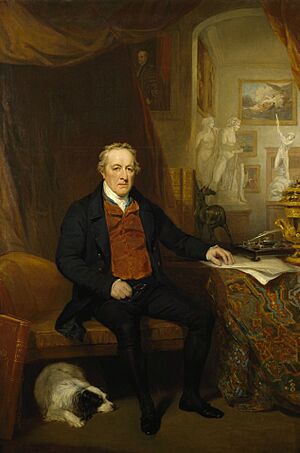Assassin (horse) facts for kids
Quick facts for kids Assassin |
|
|---|---|
| Sire | Sweetbriar |
| Grandsire | Syphon |
| Dam | Angelica |
| Damsire | Snap |
| Sex | Stallion |
| Foaled | 1779 |
| Country | Kingdom of Great Britain |
| Colour | Bay |
| Breeder | Lord Egremont |
| Owner | Lord Egremont |
| Trainer | F. Nealy |
| Record | 11: 8–2-1 (incomplete) |
| Major wins | |
| Epsom Derby (1782) | |
Assassin was a famous Thoroughbred racehorse born in 1779. He is best known for winning the Epsom Derby, one of England's most important races, in 1782. This was the first Derby win for his owner and breeder, Lord Egremont. Assassin raced until he was five years old. After his racing career, he retired to Lord Egremont's farm in Petworth.
Contents
Background and Early Life
Assassin was born in 1779 at Petworth House, a large estate owned by Lord Egremont. His father, a horse named Sweetbriar, was a champion who never lost a race. His mother was a mare named Angelica. She had eleven foals in her lifetime, and Assassin was her eighth. Angelica lived until 1787.
A Champion's Racing Career
Assassin was trained by F. Neale in the town of Newmarket, a center for horse racing in England. Over his career, he won eight of his eleven recorded races.
1781: First Year of Racing
Assassin started racing as a two-year-old. In October, he won a special race against a single opponent, a colt named Puzzle. This type of race is called a match race.
Later that year, he came in second place in two other races. He also had a match race scheduled against a horse named Plutus, but Assassin did not compete, so he had to forfeit, or give up, the race.
1782: Winning the Epsom Derby
When Assassin was three, he had his most successful year. At the Craven meeting, he was supposed to race in a sweepstakes, where the winner takes all the prize money. When the other two horses backed out, Assassin's owner received 70 guineas as a compromise. A guinea was a gold coin used in Britain at the time.
On May 9, 1782, at Epsom, Assassin won the famous Derby. He beat two other top horses, Sweet Robin and Fortunio. This was a huge victory for his owner, Lord Egremont, who would go on to win the Derby four more times with other horses.
Later that year, Assassin won a match race against a horse by the famous sire Eclipse. He also won another match race against a colt named Achilles.
1783: A Strong Four-Year-Old Season
As a four-year-old, Assassin continued to be a top competitor. He won several races because his opponents forfeited, meaning they did not show up to race him.
He also won an exciting match race against Pot-8-Os, a colt that later became a very important sire. A few days later, he beat another horse named Columbus in a race with a large prize of 500 guineas.
1784: Final Year on the Track
In his last year of racing, Assassin competed in a sweepstakes race and finished third. His owner also decided to back out of two different match races. After this season, the five-year-old horse was retired from racing.
Life After Racing
After his racing career, Assassin became a sire. This means he was bred with female horses (mares) to produce new foals. He lived at Lord Egremont's farm in Petworth. By 1789, the fee to breed a mare with him was two guineas.
For the 1793 season, he was moved to a different farm, and his fee was raised to three guineas. However, he was not considered a very successful sire, as his children did not become famous racers. His last recorded year as a sire was 1794.
Family Tree
| Sire Sweetbriar (GB) Chestnut, 1769 |
Syphon 1750 |
Squirt | Bartlett's Childers* |
|---|---|---|---|
| Sister to Old Country Wench | |||
| Patriot Mare | Bolton Patriot | ||
| Crab mare | |||
| Shakespeare Mare 1763 |
Shakespeare | Hobgoblin | |
| Amorett*^ | |||
| Miss Meredith | Cade^* | ||
| Amorett*^ | |||
| Dam Angelica Brown, 1761 |
Snap 1750 |
Snip | Flying Childers |
| Sister to Soreheels | |||
| Sister to Slipby | Fox | ||
| Gipsy | |||
| Regulus Mare 1749 |
Regulus | Godolphin Arabian* | |
| Grey Robinson | |||
| Childers Mare | Bartlett's Childers* | ||
| Sister One to True Blue |
* A horse's pedigree is like a family tree. Assassin was inbred to the stallion Bartlett's Childers. This means Bartlett's Childers appears multiple times in his family tree on both his father's and mother's side.
* Assassin was also inbred to another famous stallion, the Godolphin Arabian. This horse appears on both sides of his pedigree as well.


